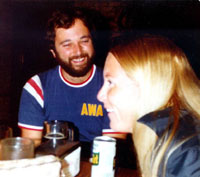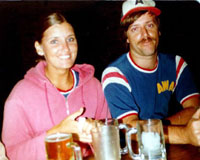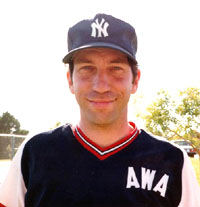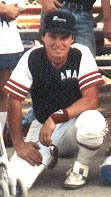 | |

|
With the consistent success of the team, AWA Enterprises continued to rise in the San Jose softball rankings. The team, to date, had answered the challenge of each new level with a championship trophy, and with the start of the 1979 campaign, AWA found itself in the city's top Wednesday night league.
The boys of AWA showed no fear at this lofty level, reeling off wins in four of its first five games. Only one game remained in the first half, but it was a doozy. Waiting in the wings was the greatest test in AWA's short history -- perennial powerhouse Kessler, who had not lost a game and held its familiar grasp of first place. To the surprise of just about everyone except the boys in AWA blue, the team came through once again, trouncing Kessler by an impressive score of 18-10. This forced a one game playoff, to be played the following week, for the first half pennant. This was high water mark for AWA Enterprises softball. Up to this point, the team had played 87 games in its young history, winning 59 and tying once for a whopping .686 winning percentage. We had played in four leagues and won three of them. We had a tournament championship under our belts, as well as a second and a couple of thirds. And now we had just whipped the best team in the city's best Wednesday night league. This was familiar territory for the boys of AWA, with another spot in the playoffs within sight. But Kessler rose up and showed its true might the following week in the playoff game, delivering AWA a decisive 15-2 knockout punch. The AWA Enterprises Softball Club promptly skidded into three years of softball mediocrity and frustration. The team won only five of its last 16 games of 1979 and finished, at 10-12, with its first losing season. All the while, storm clouds were darkening over the team and among the players. Factions had become severely divided about the direction of the team, including who should or should not be playing. And the addition of Al Wylie, with Neil's brothers Brian Christie and Mark Christie as new players only exacerbated the situation. Neil, who was trying to keep a happy camp in order, found himself under tremendous pressure and criticism from all sides. We had always had an "everyone plays" philosophy, and that we were "friends and family" first, and a competitive softball team second. But success on the field had skewed the vision, and as the losses began to mount, issues of selfishness and favoritism arose. Where people batted in the order became a point of argument, and there was plenty of jealousy and finger-pointing to go around. Longtime frienships were now being affected, and there was concern that the team might actually disband. One very positive move the team made prior to the 1980 season was to dump the original royal blue, red-striped jerseys for a navy blue shirt with white sleeves that became the official look of the team over the next decade. But even though the guys looked sharp for the team picture, AWA Enterprises didn't look all that good on the field. We dropped back down into the "C" division, hoping recapture our winning ways, but AWA continued to struggle. Joe's brother Steve Sammut came on board that year, as did AWA's long-time "spirit guide" Mike Simonds, which definitely made us a better team on paper. But the continued animosity among the guys carried over onto the field, where the losses and poor play were becoming even more bothersome. Players within the factions were now feuding with each other. Neil tried to hold it all together, but he was fighting a losing battle. Oh, there was one bright moment in July, when the team played in the "B" level Mohawks Tournament. The team caught lightning in a bottle that weekend and rolled to a second place finish. Steve Sammut copped a co-MVP award, while Brian Christie, Gary Matsushita, and Steve Barrett each were named all-tourney. But this weekend of triumph was only an aberration in a season of discontent, and AWA soon reverted to its losing ways. Finally, in August of 1980, Neil Christie resigned as manager, citing simply that it wasn't fun to manage this team anymore. In truth, Neil was finally fed up with the divided loyalties and political backstabbing among the guys. With the future of the team in serious doubt, Mike Applegate was an agreeable compromise by everyone to assume the reins of the team as manager. But Mike made one point clear -- if attitudes didn't change the team had no future. The message may have been received, but it didn't help the play on the field. AWA won only two of the last seven games of the season. Truly, the end of the AWA dynasty appeared to be at hand. Before the start of the 1981 season, Brian's best friend Greg Brown joined the team. Brian boldly predicted that Greg would be a dominant force in the AWA lineup, and was he ever! Along with Steve Barrett, who also had an excellent year, the two gave the team a regular two-man Murderer's Row. Unfortunately, the rest of the team went right into the tank, and in the face of a very difficult schedule, AWA finished the year with a miserable 10-17 record. At one point, the team lost nine straight games. The season was symbolized that summer with AWA's annual trip to Lake Tahoe. For the opening game of this "B-C" tournament, AWA was matched up against Coca Cola, who at the time was the #1 ranked "B" team in all of Nevada. The tournament director even apologized to us for our unfortunate draw. But AWA played an inspired game, making several outstanding defensive plays to keep the game close. With the score tied 6-6 in the bottom of the seventh, Coca Cola won the game with a two-out inside-the-park home run that took a freak bounce off the fence in left. It was a terrible case of bad luck, but we were 7-6 losers. Then, while we waited for our second game, and with all our equipment stacked together, our bats were stolen -- all of them. Reduced to borrowing bats from the our second game opponent, we lost 12-1 for an early and inglorious tournament exit. It was suggested that getting new bats might help our sagging record, but bats were the least of our problems. Things had become so low that nobody really noticed we weren't bickering anymore.
 |













